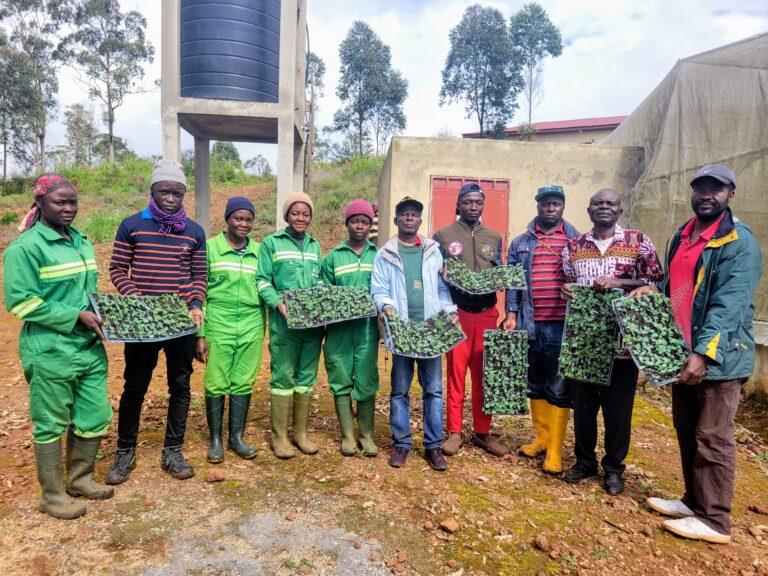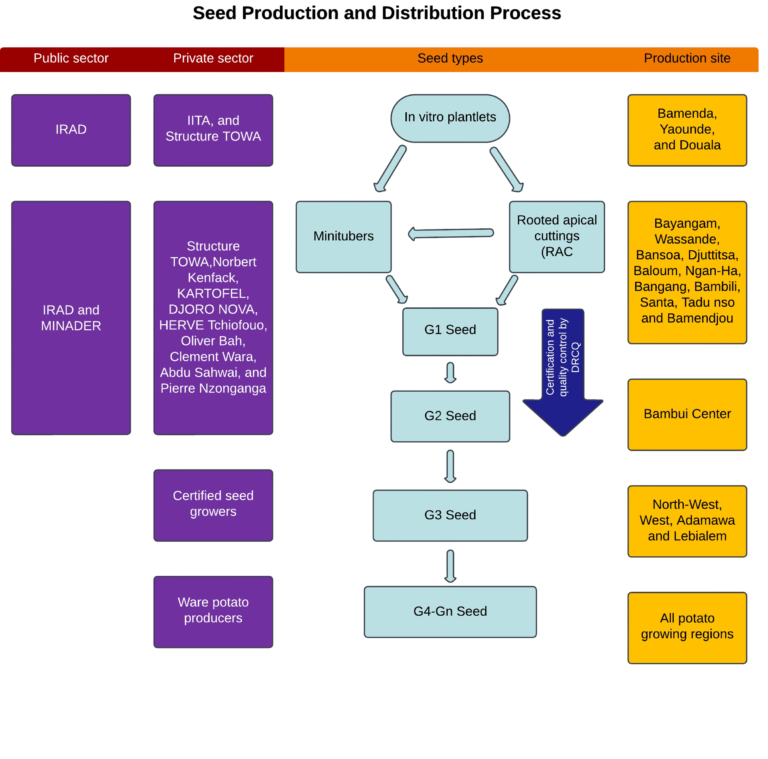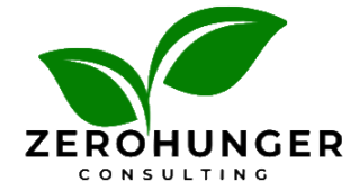Revitalizing Cameroon’s Seed Potato Sector Through Dynamic Public- Private Partnerships

Cameroon has embarked on an exciting journey to transform the seed potato sector! By harnessing the power of collaboration between public entities and private enterprises, key players elevate agricultural practices, boost the productivity of market-preferred varieties, and ensure a sustainable future for farmers and consumers alike.
Context
Potato (Solanum tuberosum L.) is an important crop cultivated in five of Cameroon’s ten regions, specifically in the West, North-West, Adamawa, South-West, and Far-North regions. Hence, the government has prioritized potato as one of the key crops in the National Development Strategy 2022-2030 and the National Compact Investment Plan 2030. Production exceeds 300,000 metric tons annually with an average yield of 11 metric tons per hectare, and cultivation is expanding to other regions.
The Government of Germany, through the German Ministry of Economic Cooperation and Development (BMZ) special initiative “One World Without Hunger (SEWOH)” and the Green Innovation Centres for the Agriculture and Food Sector Project (ProCISA), partnered with the International Potato Center (CIP), the Ministry of Agriculture and Rural Development (MINADER) and the Institute of Agricultural Research for Development (IRAD) to co-implement a potato project. This project aimed to address challenges in the potato sector, introduce technical and institutional innovations, and increase efficiency and productivity to increase income from potato farming in specific regions of Cameroon. This brief describes developments after the project and IRAD’s initiatives to advance the transformation of seed systems toward a critical point of no return.
A Revamped National Seed Scheme
One of the project’s significant achievements was establishing a national potato seed system, which is expected to lead to seed self-sufficiency. Previously, the government had to import seed potatoes annually from Europe; however, local private-sector suppliers have now been empowered to provide clean seed. In 2023, the government ordered 500 tons of seed potatoes from commercial growers, demonstrating confidence in these local suppliers.
Following the success of the first seed growers, more private actors became interested in building screenhouses. Currently, Cameroon has three potato tissue culture laboratories and thirteen functional screenhouses, most of which are privately owned. This surge in investment is due to project efforts to introduce private seed growers to these technologies through open days held at the IRAD Antenna of Bayangam, West region. They received tailored advice and guidance to make the new technologies economically viable for interested partners. The seed growers who were not financially capable of constructing screenhouses have gotten partnerships with some screenhouse owners for the regular supply of rooted apical cuttings (RAC) or early-generation tubers, which has eased the flow of high-quality planting material along the seed production chain in the country. In 2024, IRAD and private seed growers produced approximately 30 metric tons of high-quality, early-generation tubers (Generation 1 (G1) and Generation 2 (G2) seed potato), and over 500,000 rooted apical cuttings (RACs) were generated across all screenhouses.

Figure 1. Current National Seed Potato Scheme in Cameroon
New Varieties for a Self-reliant National Seed System
Unica and Chulu are excellent varieties that produce smooth, sizable tubers and yield generously. The first individuals who tried the initial tubers I produced continue to request more of these varieties. I am excited about the marketing opportunities that these new technologies bring to farmers.”
Dr. Ajambang Walter, former Chief of the IRAD Regional Center in Bambui, stated,“Importers encountered several issues with seeds imported from Europe. These included some varieties that local consumers did not readily accept and some delays and bottlenecks at the entry port. However, with new, adaptable varieties like Unica and Chulu from CIP, these problems are now a thing of the past.”
A Young but Dynamic National Seed Potato Growers Association
To better ensure that their voices are heard at national and international levels, seed potato growers established a national association with the support of the Government of Cameroon, an initiative funded by the German Government through GIZ. This association unites seed growers nationwide, enabling them to advocate for improved collaboration among themselves, input and output market players, and government agencies. The association has established a working partnership with IRAD, which has allowed screenhouse owners to regularly receive in-vitro plantlets from the IRAD Tissue Culture Laboratory located in Bamenda, North-West Region, along with customized technical support. As a result of this partnership, the potato seed growers’ technical skills have significantly improved.
Mr. Kenfack stated,
“Our collaboration with IRAD has been excellent. They provide reliable technical support and deliver in vitro plantlets as planned, encouraging us to continue this journey. Their professionalism is impressive; seed growers no longer need to travel long distances. Once the financial obligations are met, the plantlets are delivered directly to their doorsteps.”
Information and communication technology (ICT) has become integral to the association’s operations. Members are very active on social media platforms, with WhatsApp and Facebook widely used for advertising and marketing. They have created WhatsApp groups where they discuss important issues and make significant decisions impacting the association and the seed system. This highly inclusive approach allows farmers from all parts of the country to participate and share their opinions with minimal effort and from the comfort of their homes. As a result, the need for frequent in-person meetings has decreased, which the farmers find particularly appealing.
Increased Capacity for Seed Certification and Quality Control
Quality assurance is essential for seed systems across all crops, especially vegetatively propagated ones. To support this, the CIP project equipped four phytosanitary laboratories at the Directorate of Regulation and Quality Control of Agricultural Products and Inputs (DRCQ) and provided training for lab technicians. Those facilities are in Yaoundé, Bafoussam, Bamenda, and Ngaoundéré. As a result, farmers can now send samples for viral diagnosis and receive reliable results quickly, gradually enhancing the sector’s professionalism. The MINADER, in collaboration with CIP, IRAD, and key stakeholders in the seed industry in Cameroon, developed a draft regulation concerning potato seed production ,control , and certification, including RAC technology. This draft regulation was reviewed and approved by the National Council for Seeds and Varieties (CONSOV) in January 2024 and was signed by the minister in August 2024. This regulation ensures seed growers adhere to specific standards and produce high-quality planting materials.
Authors: Clinton Nkimih and Dieudonné Harahagazwe
Contact person: Clinton Nkimih: nkimihbclinton@gmail.com
About the authors:
Clinton Nkimih is a researcher at the Institute of Agricultural Research for Development (IRAD) and the Chief of the IRAD Bayangam Antenna, which is exclusively dedicated to potato research.
Dieudonné Harahagazwe is the Principal Consultant at ZeroHunger Consulting (ZEHUCO).

